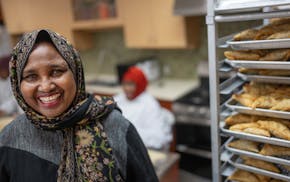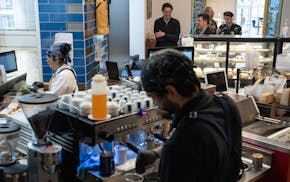St. Paul's Mischief Toy Store may not have enough inventory for the Christmas season, putting it in financial jeopardy from President Donald Trump's tariffs on Chinese goods, co-owner Dan Marshall said.
The Grand Avenue mainstay has joined nine other small businesses challenging the legality of Trump's power to impose the tariffs, including 145% levies on goods from China, where most toys are manufactured.
"This is an existential threat for us. Our vendors are raising prices across the board," Marshall said. "A lot of them seem to be delaying imports altogether so by the time Christmas comes around we won't be able to meet demand."
A few of Mischief's suppliers have already canceled orders, and some have left the U.S. market altogether, Marshall said. He estimates a $10 toy will be $25 under the current tariffs.
Mischief is the only toy store among the plaintiffs. Others include a game manufacturer, a children's clothing company, a food-service glove company and a metal treating company.
The lead plaintiff, Stonemaier Games, filed a federal lawsuit last week in New Jersey, represented by the Pacific Legal Foundation, a nonprofit public interest law firm based in California. Marshall said the law firm also is representing the toy store free of charge.
The crux of the lawsuit is that the Emergency Powers Act, cited by Trump to enact so many increases in tariffs, does not apply now.
"A trade imbalance is not an emergency," Marshall said. "We've had that for like 50 years."
Trump has cited the trade imbalance and the need to bring back domestic manufacturing as reasons for the higher tariffs.
"We will not stand idle while our livelihood — and the livelihoods of thousands of small-business owners and contractors in the U.S. — are treated like pawns in a political game," Jamey Stegmaier, co-founder of Stonemaier Games, said in a statement.
Mischief is co-owned by Marshall; his wife, Millie Adelsheim; and their daughter, Abigail Adelsheim-Marshall.
Dan Marshall credits his daughter with the creation of the store, saying it was her idea to focus on diversity, representation and social justice.
While the impact on their business is top of mind, Marshall and his family are also concerned about what Trump might do if he's not challenged.
"This is a situation where we have the standing to stand up to him, and we have the duty to do that," Marshall said. "Whatever blowback that creates, we're willing and ready to face that to stand up for what we believe in."
Marshall spoke at a DFL-sponsored news conference April 10, which is how Pacific Legal Foundation found him.
At the news conference, Marshall said he and his wife are "crazy with anxiety" about the tariffs and how to plan for inventory changes.
The family-owned business, like most retailers big and small, relies heavily on holiday sales.
"Christmas is when we pay our bills and make a profit to go into the next year with," Marshall said.
The toy store typically starts buying inventory for Christmas in September. But if the vendors don't have the goods, Mischief won't have inventory to sell.
He wishes he could write orders for what he needs now, "but we have nowhere near the cash reserves to do that."
Initially, Marshall was told there would be surcharges and increased prices on imports. But when the 145% tariff was announced, vendors began to realize they can't afford to import products.
The toy store works with 100 vendors who might all approach the tariffs differently, Marshall said.
"There is no planning for any of this," especially with the tariff plan changing so often, Marshall said.
Mischief could not switch to U.S. manufacturers even if Marshall wanted to.
The family previously owned Peapods, a natural toys and baby care store that closed in 2015. Peapods held a Minnesota Toy Fair to promote local toymakers and founded the Handmade Toy Alliance to support small batch U.S. toymakers.
Those supply chains don't exist anymore, he said.
Marshall and his family have watched over the past 25 years as toy manufacturers based in America, Germany and France moved production to China.
Recently, Two Bros Bows, a U.S. maker of archery sets for children, told Marshall it is closing.
"Tariffs aren't going to suddenly bring back these toymakers because even at 145%, it would still be cheaper to make things in China than it would be to set up shop here," Marshall said. "The capacity here no longer exists."
Even if Mischief ends up with holiday inventory, Marshall is nervous about economic uncertainty. The tariffs could lead to inflation and possibly recession, forecasters have said.
"If customers don't have the money to buy toys, it won't matter what Mischief has available," Marshall said. "That's a horrible combo for anybody, particularly small businesses."

Somali-owned Hoyo will soon see its sambusas in Lunds, at the State Fair and a new batch of school districts

Trump once tried to buy the Minnesota Twins. His new budget bill could complicate team's sale.

Why now might be the best time to make a deal on boats, ATVs and other powersports

To reset downtown Minneapolis skyway life, building owners cut deals with retailers
